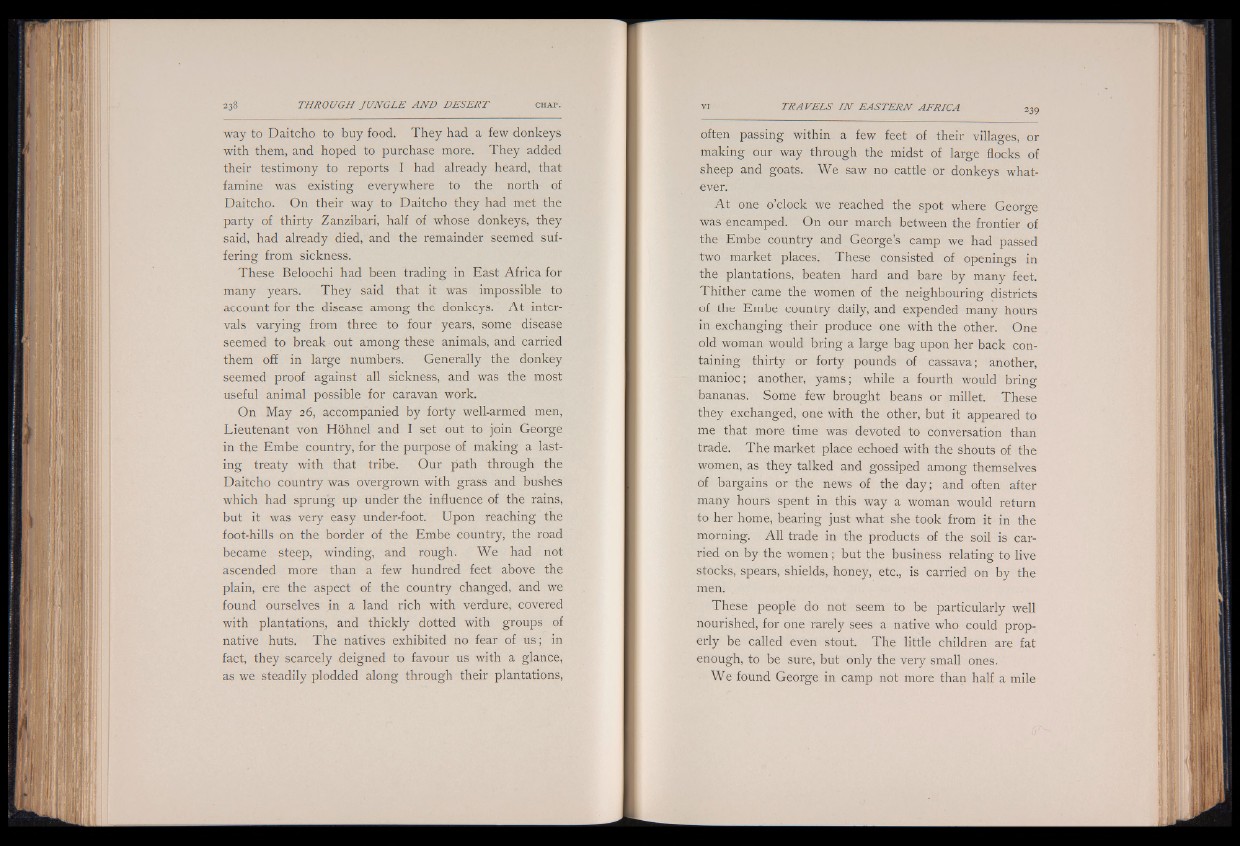
way to Daitcho to buy food. They had a few donkeys
with them, and hoped to purchase more. They added
their testimony to reports I had already heard, that
famine was existing everywhere to the north of
Daitcho. On their way to Daitcho they had met the
party of thirty Zanzibari, half of whose donkeys, they
said, had already died, and the remainder seemed suffering
from sickness.
These Beloochi had been trading in East Africa for
many years. They said that it was impossible to
account for the disease among the donkeys. A t intervals
varying from three to four years, some disease
seemed to break out among these animals, and carried
them off in large numbers. Generally the donkey
seemed proof against all sickness, and was the most
useful animal possible for caravan work.
On May 26, accompanied by forty well-armed men,
Lieutenant von Hohnel and I set out to join George
in the Embe country, for the purpose of making a lasting
treaty with that tribe. Our path through the
Daitcho country was overgrown with grass and bushes
which had sprung up under the influence of the rains,
but it was very easy under-foot. Upon reaching the
foot-hills on the border of the Embe country, the road
became steep, winding, and rough. We had not
ascended more than a few hundred feet above the
plain, ere the aspect of the country changed, and we
found ourselves in a land rich with verdure, covered
with plantations, and thickly dotted with groups of
native huts. The natives exhibited no fear of us; in
fact, they scarcely deigned to favour us with a glance,
as we steadily plodded along through their plantations,
often passing within a few feet of their villages, or
making our way through the midst of large flocks of
sheep and goats. We saw no cattle or donkeys whatever.
A t one o’clock we reached the spot where George
was encamped. On our march between the frontier of
the Embe country and George’s camp we had passed
two market places. These consisted of openings in
the plantations, beaten hard and bare by many feet.
Thither came the women of the neighbouring districts
of the Embe country daily, and expended many hours
in exchanging their produce one with the other. One
old woman would bring a large bag upon her back containing
thirty or forty pounds of cassava; another,
manioc; another, yams; while a fourth would bring
bananas. Some few brought beans or millet. These
they exchanged, one with the other, but it appeared to
me that more time was devoted to conversation than
trade. The market place echoed with the shouts of the
women, as they talked and gossiped among themselves
of bargains or the news of the day; and often after
many hours spent in this way a woman would return
to her home, bearing just what she took from it in the
morning. All trade in the products of the soil is carried
on by the women; but the business relating to live
stocks, spears, shields, honey, etc., is carried on by the
men.
These people do not seem to be particularly well
nourished, for one rarely sees a native who could properly
be called even stout. The little children are fat
enough, to be sure, but only the very small ones.
We found George in camp not more than half a mile